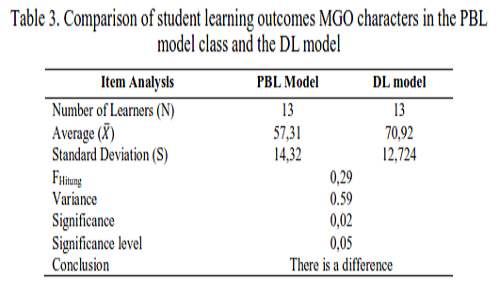
The Influence of Learning Model on Chemical Learning Outcomes Viewed from Goal Orientation Participants in Senior High School
Abstract
Keywords
Full Text:
PDFReferences
Aldila, C. K., Subandi, & Endang, B. (2018) Pengaruh Strategi Process Oriented Guided Inquiry Learning (POGIL) terhadap Keterampilan Berpikir Kritis Siswa pada Pembelajaran Ikatan Kimia, Jurnal Pendidikan: Teori, Penelitian, dan Pengembangan, 3(8), 78-89
Andri, S., Zulkarnain, & Sehatta, S. (2019). Application of Cooperative Learning Models of Think Pair Shere Type to Improve Student Mathematics Learning Outcomes.Journal of Educational Sciences, 3(2), 237-248
Anderman, E.M., & Anderman, L.H. (2013). Classroom Motivation Second Edition, rw.pearsonhighered.com, ISBN-13: 978-0-13-301788-5, ISBN-10: 1 0-13-301788-5.
Antina, D., Dasna, I.W., Munzil. A. (2015). Pengaruh Orientasi Tujuan Terhadap Pemahaman Konsep Kesetimbangan Kimia Peserta didik Yang Dibelajarkan Dengan Inkuiri Terbimbing Dan Cooperative Learning Cycle 5e. Prosiding Seminar Nasional Kimia, ISBN: 978-602-0951-05-8, Jurusan Kimia FMIPA Universitas Negeri Surabaya, 3-4 Oktober 2015
Arends, R. (2012). Learning to Teach Ninth Edition. New York, NY :The McGraw-Hill Companies, Inc.
Balim, A.G. (2009). The Effects of Discovery Learning on Students’ Success and Inquiry Learning Skills. Egitim Arastirmalari-Eurasian Journal of Educational Research. 3(5), 1-20.
Creswell, J.W. (2014). Research design: qualitative, quantitative, and mixed methods approaches — 4th ed.Singapore ; SAGE Publications Asia-Pacific Pte.Ltd
Dahling, J. J., & Ruppel, C. L., (2016). Learning Goal Orientation Buffers The Effects of Negative Normative Feedback on Test Self-Efficacy and Reattempt Interest, Learning and Individual Differences, 50, 296–301.
Diarni, J., & Suarman, S. K., (2018). Accomplishment Motivation and Soft Skill Related to Learning Achievement. Journal of Educational Sciences. 2 (2), 83-89
Elliot, A.J., & Hulleman, C.S., (2017) Handbook of Competence and Motivation-Theory and Application (2nd) : editors, Elliot. A.J, Dweck,C.S., Yeager. D.S, New York : The Guilford Press
Fraenkel, Jack, R., & Wallen, N. E. (2009), How to design and evaluate research in education—7th ed. Published by McGraw-Hill, an imprint of The McGraw-Hill Companies, Inc., 1221 Avenue of the Americas, New York, NY 10020.
Geitz, G., Brinke. D.J., & Kirschner, P.A. (2016). Changing Learning Behaviour: Self-Efficacy and Goal Orientation in PBL Groups in Higher Education, International Journal of Educational Research, 75, 146–158
Güler, M. (2017). The Effect of Goal Orientation on Student Achievement.dalam The Factors Effecting Student Achievement, Editor : Karadag. E, ISBN 978-3-319-56083-0 (eBook) DOI 10.1007/978-3-319-56083-0, ©Springer International Publishing AG 2017
Hazari, Z., Potvin,G., Tai, R.H., & Almarode, J. (2010). For the love of learning science: Connecting learning orientation and career productivity in physics and chemistry, Phys. Rev. ST Phys. Educ. Res. 6, 010107
Hmelo-Silver, C.E., &Barrows, H.S. (2008).Facilitating Collaborative Knowledge Building, Cognition and Instruction, 26:1, 48-94, DOI: 10.1080/0737000070179849
Kadiouglu, C., & Uzuntiryaki, E. (2008). Motivational Factors Contributing to Turkish High School Student’s Achievement in Gases and Chemical Reactions. Makalah disajikan pada American Educational Research Association (AERA), New York, 24-28
Keys, T.D., Anne, M.M.C., Duncan, G.J., & Domina, T. (2012). The role of Goal Orientations for Adolescent Mathematics Achievement, Contemporary Educational Psychology 37 47–54, 0361-476X/$ - see front matter2011 Elsevier Inc. All rights reserved. doi:10.1016/j.cedpsych.2011.09.002
Marina, Indrawati, Suarman. (2019). Application of Moving Class Learning Models and Teacher Pedagogical Competence on Learning Motivation and Student Learning Discipline.Journal of Educational Sciences, 3(1), 72-83
Masykurni, Gani, A., & Khaldun. I. (2016). Penerapan Model Problem Based Learning (PBL) Berbasis Komputer Untuk Meningkatkan Sikap Ilmiahdan Hasil Belajar Pada Konsep Ikatan Kimia Di Sma Negeri 1 Padang Tiji, Jurnal Pendidikan Sains Indonesia, 4(2), 83-95.
Ormrod, J.E. ( 2012). Human Learning-Sixth Edition, Pearson Education, Inc. New Jersey.
Puji, R., Mardiyana, & Dewi, R.S.S. (2015). Eksperimentasi Model Problem Based Learning dan Discovery Learning Pada Materi Perbandingan Dan Skala Ditinjau Dari Sikap Peserta Terhadap Matematika Didik Kelas VII SMP Kabupaten Klaten Tahun Pelajaran 2013/2014. Jurnal Elektronik Pembelajaran Matematika, 3 (3), 242-256,
Putrayasa, I.M., Syahruddin, H., & Margunayasa, I.G. (2014). Pengaruh Model Pembelajaran Discovery Learning Dan Minat Belajar Terhadap Hasil Belajar Ipa Siswa, Jurnal Mimbar PGSD Universitas Pendidikan Ganesha, Jurusan PGSD 2(1)
Saab, N., Joolingen, W.R., & Hout‐Wolters, B.H.A.M. (2009). The Relation of Learners’motivation With the Process of Collaborative Scientific Discovery Learning, Educational Studies, 35(2).
Suharsimi. A. (2015). Dasar-Dasar Evaluasi Pendidikan, Bumi Aksara, Jakarta
Sungur, S & Tekkaya.C, (2006) Effects of Problem-Based Learning and Traditional Instruction on Self-Regulated Learning, The Journal of Educational Research, Vol : 99:5, 307-320, Publisher: Routledge.
Wiwit, Z.W., Oktavia, S., & Dedek, S. (2017). Analisis Kemampuan Berargumentasi Ilmiah Materi Ikatan Kimia Peserta Didik Sma, Man, Dan Perguruan Tinggi Tingkat I, Jurnal Pembelajaran Kimia, 2(2), 30-40
Woolfolk.A., (2016). Educational Psychology, Pearson Education, Inc.
DOI: http://dx.doi.org/10.31258/jes.3.3.p.423-432
Refbacks
- There are currently no refbacks.
Copyright (c) 2019 Miftah Athor Sanjaya, Asmadi M. Noer, Roza Linda

This work is licensed under a Creative Commons Attribution 4.0 International License.
Publisher: FKIP Universitas Riau













